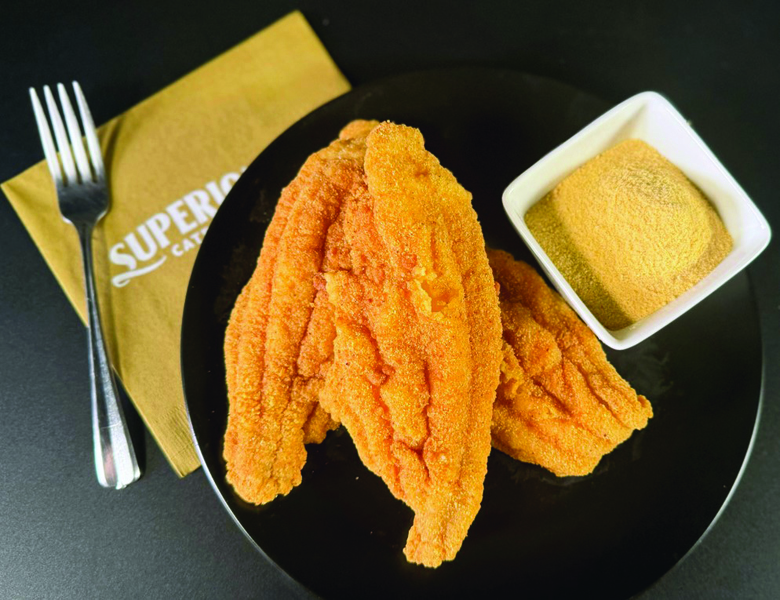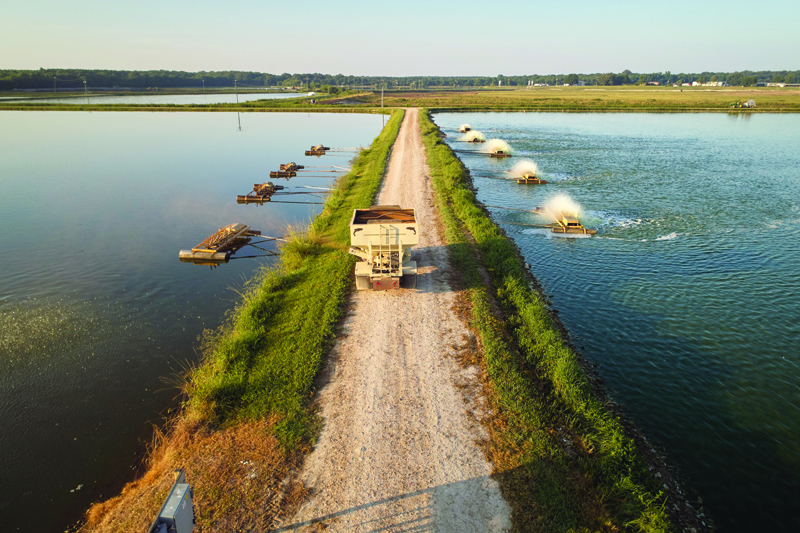Superior Catfish produces 18 million pounds annually
Every day, an average of 75,000 pounds of catfish churn through Superior Catfish’s processing facility. Annually, that’s 18 million pounds.
Superior Catfish, in business for nearly half a century, supplies high-quality catfish products, from small, family-managed farms in Noxubee County to retail and wholesale customers– and now consumers.
In August, Superior Catfish opened an online marketplace (store.superior
catfish.com). Since then, orders have been coming in from all over the U.S. To launch the online store, Superior Catfish cleverly collaborated with cookbook author and social media influencer Brenda Gantt, who demonstrated how to cook Superior Catfish on her popular streaming channel. In fact, on a busy football Saturday in October, roughly 1,200 people traveled to Macon from all over the U.S. to meet Gantt and sample Superior Catfish products. With the influx of travelers trying to access Superior Catfish’s parking lot, local law enforcement was called to help maintain traffic flow on Highway 45.
On site, lines of Gantt fans snaked to the road. The 10:00 a.m. to noon event lasted until nearly 4:00 p.m., with the retired schoolteacher selling more than 800 cookbooks and signing hundreds more. Superior Catfish packages sold in droves.
Earlier in the month, Superior Catfish hosted the first annual Catfish Cookoff in conjunction with the annual Dancing Rabbit Festival. Amateur chefs whipped up secret batters and special sauces for signature catfish recipes (fried, boiled, baked) in appetizers, entrees, and side dishes. Is a Superior Catfish cookbook far behind?
Tightly Bound
Noxubee County’s largest private employer began simply as Saul Fish Processors in 1978, with a single catfish farmer, Bill Saul—a Mennonite—who had discovered a new use for the irrigation pond on his Noxubee County farm. Why not grow catfish like farmers in the Mississippi Delta? Saul sold hand-dressed catfish to grocery stores, along with his farm vegetables.
As sales of catfish grew, soybean prices dropped. By 1983, the soybean market had crashed. Saul encouraged his fellow Mennonite farmers in Noxubee County to convert their soybean acreage into catfish ponds. Saul bought and processed their fish and in 1989, and with quality of paramount importance, he built a facility that increased production speed and capacity.
Nearing retirement in 1994, Saul sold the company to the community farmers who had supplied him. Noxubee County Producers Inc., aka Superior Catfish Products, opened a facility to process 30,000 pounds of catfish daily.
Fast forward to 2021: Superior Catfish, owned by 42 local catfish farmers, opened a $17 million expansion project that doubled the size of the catfish processing plant and turned the former facility into dry storage space, bringing the plant’s total square footage close to 74,000.
“Our story is always impressive to people,” said Jody Giesbrecht, board president. “And people are appreciative of the craftsmanship and the time and the extra steps that go into making sure the quality of our products is exceptional.”

Difference Makers
What’s different about Superior Catfish? For one, there are smaller farms and fewer of them than usual, which contributes to a lower risk of disease spread and positively to the local economy and overall sustainability of the fish farming practices. Prior to harvest, multiple catfish are inspected for smell, taste, and texture. The company takes extra steps to ensure catfish are always “on flavor.”
“As a grower, it’s almost frustrating sometimes because it’s so hard to meet Superior’s specifications. They sample catfish rigorously,” said Giesbrecht. “They set the bar much higher for flavor than the competitors.”
Giesbrecht asked: “Have you ever eaten catfish that tasted mossy?
“When we talk about off flavor, we’re talking about that kind of mossy taste,” he explained. “It takes a lot on the farmer’s side to keep that managed.”
Catfish farmers address taste on the front end. “When we dig our ponds, we remove the topsoil, build the levees, and wind up with a lime rock base,” said Giesbrecht. “Lime rock lends itself to a good algae and a better tasting catfish.”
Also of utmost importance to the company: its retention rate of employment. Employment now stands at 142 and 40% of employees have worked at the company for at least a decade.
“Our founder said, ‘Our people are our most valuable asset. Full stop. Farm to table, nothing matters more,’” said Clark Seiler, manager. “It means as much today as it did then.”


The Mennonite Distinction
About 150 to 200 Mennonite families live in Noxubee County. Overall, Mennonites have several distinctions that set them apart and make them excellent businesspeople. For example, their strong work ethic, adaptability, networking and collaboration, and focus on long-term sustainability. They deeply emphasize community life and mutual support, have a strong emphasis on spiritual over material wealth, and are heavily involved in service and charitable projects.
“Most of our children go to a private school that’s operated by the church, and it’s not uncommon for them to come help out on the farm after ninth grade and not even go on to college,” explained Giesbrecht. “There’s a strong emphasis on families working together in an agrarian-type industry. It’s not random. Agriculture is very common in the Mennonite community.”
Because of their conservative take on life, they tend to grow businesses slowly and purposefully, and not make risky moves or have too ambitious goals.
Because Superior Catfish is a private business, the company declined to disclose financial figures but based on its substantial growth and production of catfish, it’s a guaranteed success story.
“We emphasize on doing one thing and doing it well: we just process fish,” said Giesbrecht.
By comparison, with Superior Catfish producing 18 million pounds of catfish annually, the U.S. produces 300 million pounds of catfish annually. Mississippi harvests half the nation’s production, at 150 million pounds of catfish annually.
Looking Ahead
Superior Catfish has a retail store onsite that sells fresh fish daily, open weekdays 8:00 a.m. to 4:30 p.m. The company’s social media components extend to heavily trafficked Facebook and Instagram pages, with news and retail sales posted frequently.
The company is a member of Noxubee Alliance, Genuine MS, and The Catfish Institute.
Superior’s latest drive is selling its famous Superior breading and new Blackening Seasoning. The breading isn’t the basic cornmeal salt and pepper dill; it’s got a bit of a kick to it that enhances the flavor.
Superior Catfish is also on an educational mission: to continue teaching consumers the importance of asking servers about the origin of catfish in restaurants.
“Imports from Vietnam and China are harming domestic catfish producers, and those countries don’t have the high-quality standards we do,” said Giesbrecht. “It would be hard for me to overemphasize how important it is for people to understand the distinction. Right now, half of what we call catfish consumed domestically is imported and that needs to change. As a catfish farmer, I do my part when I eat shrimp. I like to know it’s domestic shrimp that was harvested in Louisiana, Mississippi, Alabama, in the Gulf preferably.”
Superior Catfish also continues to emphasize the message: Get hooked on eating delicious catfish!
“We plan long-term sustainability and continued growth in a healthy, robust way,” said Giesbrecht.


